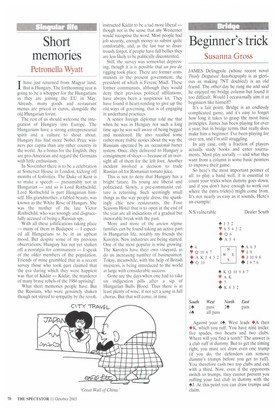Short memories
Petronella Wyatt
have just returned from Magyar land, that is Hungaiy. The forthcoming year is going to be a whopper for the Hungarians as they are joining the EU in May. Already, many goods and restaurant menus are priced in euros, alongside the old Hungarian forint.
The rest of us should welcome the integration of Hungary into Europe. The Hungarians have a strong entrepreneurial spirit and a culture to shout about. Hungary has had more Nobel Prize winners per capita than any other country in the world. As a bonus for the English, they are pro-American and regard the Germans with little enthusiasm.
In November there is to be a celebration at Somerset House in London, kicking off months of festivities. The Duke of Kent is to make a speech — presumably not in Hungarian — and so is Lord Rothschild. Lord Rothschild is part Hungarian himself. His grandmother, a fabled beauty, was known as the White Rose of Hungary. She was the mother of the late Victor Rothschild, who was wrongly and disgracefully accused of being a Russian spy.
With all these jollifications taking place — many of them in Budapest — I expected all Hungarians to be in an upbeat mood. But despite some of my previous observations, Hungary has not yet shaken off a nostalgia for communism — I speak of the older members of the population. Friends of mine grumbled that in a recent survey those who took part claimed that the era during which they were happiest was that of Kadar — MIN."-, the murderer of many brave rebels of the 1956 uprising!
What short memories people have. But the Russians. who were genuinely shaken though not stirred to sympathy by the revolt. instructed Kadar to be a tad more liberal — though not in the sense that any Westerner would recognise the word. Most people had job security, enough money to subsist quite comfortably, and, as the last tsar so disastrously forgot, if people have full bellies they are less likely to be politically discontented.
Still, the survey was somewhat depressing, though it is is possible that un pen de rigging took place. There are former communists in the present government, the president of which is Ferenc Madl, These former communists, although they would deny their previous political affiliations, have always been a suspicious lot. They have found it heart-rending to give up the old ways of governing, that is of engaging in underhand practices.
A senior foreign diplomat told me that when he was in Hungary not such a long time ago he was well aware of being bugged and monitored. He also recalled some rather more risible stories about the way the Russians operated by an occasional barter system. Once, they delivered to Hungary a consignment of shoes — because of an oversight all of them for the left foot. Another incident involved a decision to trade Russian oil for Romanian tomato juice.
This is not to deny that Hungary has a bright future. Its young are liberal and politicised. Slowly, a pre-communist culture is returning. Such seemingly small things as the way people dress, the spankingly chic new restaurants, the Four Seasons Hotel that is to open at the end of the year are all indications of a gradual but inexorable break with the past.
More and more of the ancien regime families can be found taking an active part in Hungarian life, notably my friends the Karolyis. New industries are being started. One of the most popular is wine growing. The Karolyis have their own vineyard, as do an increasing number of businessmen. Tokay, meanwhile, with the help of British investors, is being introduced to the world at large with considerable success.
Gone are the days when one had to take six indigestion pills after a sip of Hungarian Bulls Blood. Thus there is at least plenty of wine, if not yet a song in full chorus. But that will come, in time.


















































































 Previous page
Previous page